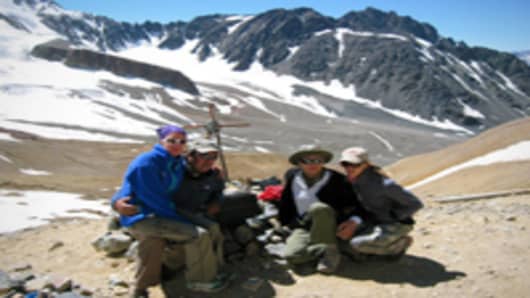I had the great fortune to spend two days last week in the Bloggers Hub at the World Business Forum in Radio City Music Hall.
Speakers of the ilk of Jack Welch, Al Gore, Joseph Stiglitz and James Cameron (yes, that James Cameron) held forth on the challenges and opportunities that lie ahead in the coming years.
Fascinating, engaging stuff, but the biggest surprise of the week was that the speaker who elicited the most profound reaction from the audience was a) not one of the headline names and b) didn't really talk about business.
The mystery presenter was Nando Parrado, a successful businessman in his own right, but someone whose life was defined before he even joined the working world: Parrado was one of 16 survivors of a plane crash in the Andes in 1972.
Just 22 years old at the time, he survived 72 days in the mountains without access to food or drinking water. His is one of the stories chronicled in the movie "Alive."
"Making decisions became easier because I knew that the worst thing that could happen would be that I would be wrong."
Throughout his presentation, Parrado stressed that his experiences have left him in a unique position when it comes to facing challenges in life: he knows that no decision he makes will ever be as difficult—or have as much at stake—as the ones he was forced to make to save his own life. He makes the point with considerable clarity onhis own website:
"Making decisions became easier because I knew that the worst thing that could happen would be that I would be wrong."
Far from being a litany of the leadership or survival skills he learned along the way, the message at the core of Parrado's presentation was much simpler, and infinitely more important. As he put it: "From the crash, I didn't learn to be a MacGuyver of the Andes; I learned about love."
He did so, in part, by losing both his mother and his sister in the same crash, and by having to come to terms with the fact that they were on the plane only because he had invited them to accompany him.
And, having been lost in the mountains for so long, he also lived through the trauma of going home and finding that he had been given up for dead: his clothes had been given away and his sister had moved into his room.
All of which has left Parrado with a unique grasp of the importance of life, and the things that we should value. While he confessed to enjoying many of the finer things in life—from fine restaurants to expensive cars—he stressed repeatedly that nothing would stand in the way of his relationship with his family and those he loves. All of which adds up to a profound, yet simple outlook on life:
"Life isn't measured by the number of breaths you take, but by the moments that take your breath away."
Parrado finished his presentation by coming back to tackle the theme of love directly, and to impart one of the few specific, actionable pieces of advice any of the speakers had to offer over the two days of the conference:
“Don’t lose your connections, kiss the ones around you . . .because you never know what’s going to happen tomorrow.”
More Executive Strategies on CNBC.com:Where To Find A Job NowHottest States For Green JobsCollege Degrees in Most Demand: 2009Colleges That Bring the Highest PaycheckBest American CEOs of All TimePortfolio's Worst American CEOs of All TimeToday's Riskiest JobsExecutive Career Strategies
________________________________
Phil Stott is a staff writer at Vault.com in New York. Originally from Scotland, he has also lived and worked in Japan, South Korea and Eastern Europe. He holds an MA in English Literature and Modern History, and a Masters in Research in Civil Engineering, both from the University of Dundee.
Comments? Send them to executivecareers@cnbc.com


